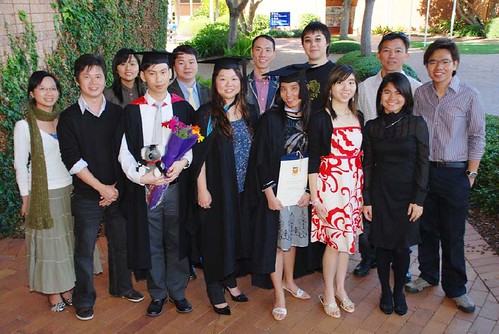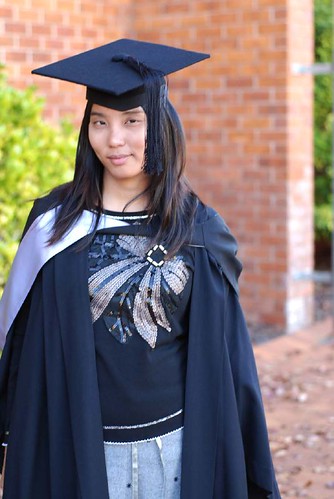A continuation of this entry.
Discussion of Results (Data Analysis and Interpretation)
Observations of the environment
The centre where the research has been undertaken is at a C&K childcare centre. C&K is one of Queensland’s largest and longest provider of community based early childhood education and childcare services. Currently, C&K has just launched a new curriculum framework, called Building Waterfalls, which the staff refer to in the planning of the activities and the overall play based programme.
How the classroom teachers plans.
The classroom being observed is managed by two classroom teachers and an assistant who take turns to share and manage the classroom over the period of the week. The centre employs a mixture of both a play-generated curriculum and curriculum-generated play in planning for the classroom activities.
“Our play-based curriculum provides a dynamic environment, which encourages exploration, enquiry and creativity, and gives children the time and opportunity to have control over their own learning” (The centre’s philosophy, refer to attachment in appendix given).
As in reference to the above, the teachers plan along these lines and alongside the children and follow the interests of the children as the day progresses. They look at their observations, evaluating it, and then plan on what they think is important and to meet the children’s needs, to extend and develop the child’s skills, and maintain continuous play as a result of their planning choices.
The teachers in the classroom use a variety of ways to observe children’s growth and learning of which these are:
- Photo stories.
- The record of the activities the children have been working on for that day.
- Curriculum Plans (using coded symbols) to maintain the children’s privacy.
- Observation sheets (that are kept in each child’s folder).
- Work samples.
- Children’s own work folders.
- Galleries displaying children’s paintings and artwork.
As the classroom is shared by two main teachers, both teachers utilize a different manner of observation to document the children’s development and learning. Although these methods of observations are different, it permits others (parents, administrators, relief staff and floaters) who view the documentation on the children’s development two different perspectives on how a child’s development can be monitored and recorded down.
Kieff & Casbergue (2000, p. 198) states that teachers who wish to foster language and literacy knowledge, skills and dispositions in young children move beyond planning and providing materials to facilitating development by engaging children in language use and interacting with them in ways that scaffold their learning.
The teachers have attempted to scaffold and extend the children’s thinking and creativity skills through strategies such as
- Initiating ideas to start on a topic of interest, such as a book or a topic of discussion to start on the topic of puppet making.
- Providing support such as providing materials to start on a project or start on an activity, i.e, wooden spoons for the spoon puppets.
- Involving the children in all aspects of the learning environment, i.e transferring the responsibility and ownership of the maintenance and care of the classroom to the children, so that the children will have a shared sense of ownership of the classroom, i.e Ruth’s farewell gift, or in the case of decorations to put up for the classroom.
- Not providing answers, but asking open-ended questions to assist children in looking for solutions, problem-solve and find out answers for themselves
- Assisting children in making choices and decisions for themselves.
- Staff and teachers to join in the children’s play, and scaffold it without taking over the children’s play.
- The teacher joining the children’s play, by providing ideas and supporting and guiding the children in their ideas, by providing questions and cues that could lead the children’s thinking to explore options not previously thought of before.
The planning proforma:
Kieff & Casbergue (2000, p.191) states that knowledge of literacy goals for young children enables teachers to make informed choices about materials, activities and play opportunities that are effective and appropriate for each child.
The planning of the activities for the class is done on a daily basis, and what the teacher has observed of the children have been working on and said for the day.
The advantages of the this strategy of planning is that it is able to extend the children’s interest onto a much deeper level, sustain their interests in the activity, and is relevant to the children’s ideas, knowledge and current thinking.
The disadvantages of this process is that because it is done as a daily planning, it cannot be planned for the week ahead, as the children’s interest may have changed by then and the activities may not be relevant to what the children are working at. Teachers have to always be in touch and observant of what the children are working at in order to provide for their learning experiences at a current pace.
According to the classroom teachers, though they plan the activity according to the interests of an individual child, it has to take into consideration the other children’s interests too so that the other children could participate in the activity as well.
How the planning is set up
Kieff & Casbergue (2000, p. 197) state that planning a classroom environment that supports and extends children’s language and literacy learning entails designing classroom centres, theme studies and projects that incorporate both oral and written language.
The mentor’s philosophy is reflected in the planning of the literacy activities where she believes that the children should take ownership of their own learning. Common centres are set-up with materials already accessible to the children.
These centres include a Collage Do-It table, Puzzles, Book Corner, Blocks, Dress-Ups and Home Corner. As with the rest of the other learning areas in the classroom, the literacy materials are set-up on low shelves where the children have easy access to.
The children have the freedom and choice to take the materials from the shelves to work with. Apart from that, the teacher also plans out other specific and structured language art activities such as sourcing and bringing out materials for puppet making, easel painting, or paint activities if she feels that they have shown an interest in it, or if they specifically requested for it.
As the centre employs a play-based programme, the children are given the time and freedom throughout the day to work with activities of their choice at the different centres. They are not hurried throughout the activity, as the teachers also believe that “it is not the end product, but the process” in doing the activity that matters, where the children learn the skills through working with the activity and experiences provided, and not making the final product. The teachers continuously make a conscious note of this statement and are always finding ways to reinforce this philosophy in the classroom to other staff, parents and visitors who may come in to observe or look at the children’s work.
What the teachers do to enhance the children’s literacy
Literacy is language in use, encompasses speaking, listening, reading, writing and critical thinking. It is developed through involvement in everyday home and community experiences. It is a process that is interactive, dynamic and purposeful. (Early Childhood Australia, 1999, viii, as cited in C&K, 2006).
The teachers state that they do not separately plan for literacy activities, or compartmentalise the developmental and key learning areas when planning for the activities in the classroom, however, instead they plan for activities that integrates the developmental and key learning areas into on activity.
As Van Hoorn, Nourot, Scales , & Alward (1993, as cited in Kieff & Casbergue, 2000, p. 186) states, play can “offer children opportunities to make meaningful use of language and literacy knowledge and skills. …and the unifying quality of play enables it to unite and integrate the socio-emotonal, motoer, and cognitive aspects of learning and development”.
In reference to this, the classroom teachers attempt to develop the children’s literacy skills through different activities such as
- Literacy games
- Name tags and name games
- Signs
- Discussion at Carpet time or any time in a 1:1 or small group.
- Pictures
- Stimulus materials
- Visual cues
- Role model language
- Reading a lot of books: reading it from left to right and pointing to the words as the words are being read.
- Use of verbal and non-verbal language
- Sign language
All these indirectly involve developing speaking and oral communication skills. Goodman (1980, as cited in Kieff & Casbergue, 2000, p. 187) states, it is continuously being accepted that literacy learning is actually language learning…that oral language development is critical to literacy as learning to read and write is simply an extension of oral language learning. Hence, it is important that children develop a good foundation and base in their oral communication skills as they learn to read and write.
The children in the classroom are engaging in emergent literacy (Clay, 1966 as cited in Kieff & Casbergue, 2000), as their knowledge of oral language is immersed in the print-rich environments of the classrooms, the children are encouraged to explore the different ways written symbols can be used.
What is the teacher’s role?
Co-Construction of Knowledge:
“When teachers use the prior experiences and current questions of children as the building blocks of their curriculum, they too have the potential to learn, be surprised, and join children as researchers (Nimmo, 2002, 9, as cited in C&K, 2006).
The teacher adopts the centre’s underlying philosophy of teaching. The centre employs a child-centered philosophy to teaching and planning activities. This is shown whereby:
- The staff shows the children how to do it.
- The staff do not just transfer the responsibility of the learning to the children, but in the process, support their needs as well.
- The staff show by supporting the children in their questioning and following up on to what the children are doing.
Kieff & Casbergue (2000) continue to state that language and literacy occur not as a result of solitary exploration of things in the classroom, but from the rich interactions that should infuse every part of the curriculum.
It is because of this reason that the teacher in their roles, attempt also to foster a classroom culture that places importance on developing social and interaction skills among the teacher and staff and each other. The teachers do this by participating and interacting with the children in their play themes and working with them as the children enact their play scripts and creations.
What responsibility children assume for their own learning?
Teachers transfer the responsibility of making right learning choices to the children by evaluating the appropriateness of the learning choices made according to the context and needs as it happens and how it happens. The teacher’s roles in this is only to guide and extend the children’s decisions as they make their choices, plan as to maintain extended interest and focus on the child’s intended play, and bring into a deeper depth so that the child can explore their own interests.
Kieff & Casbergue (2000, p. 197) state that children’s language and literacy knowledge and skills, as well as their dispositions to use those skills develop best when children interact with print and with each other, exploring, hypothesizing and creating their own rules for written language.
At the childcare centre, the teachers believe that children should take ownership of their learning. It is a conscious decision, and is incorporated into the planning that children make their own decisions. Teachers provide teaching and learning opportunities for the children such as possibilities, scaffolding, and extensions for learning. It is out of these choices, and as a result of these choices, that the program believes children will learn from the outcomes and consequences.
Kieff & Casbergue (2000, p. 197) continues to state that because children are engaged in language use for their own purposes, they are invited to construct their own knowledge about critical aspects of language.
Observation of a child: Gini
Attached are the observations of a child, Gini, who has been enrolled in the childcare centre for the past two months (2006). English is the child’s second language and she speaks a different home language that from at school.
The individuals (staff and peers) in the classroom have encouraged Gini in the development and learning of the English language skills. The results of the observations show that as a result of the play in the class, Gini from speaking only one word (12/10/06), yes and no (26/10/06), she had progressed to drawing and naming objects, communicating by showing and understanding instructions (9/11/06). The greeting card that Gini made showed she understood the meaning of words and its importance attached to words in her creations.
Conclusion
Children are able to develop skills in the language areas as the child socialises with surrounding peers, be it another child or his/her guardian. By taking part in play themes initiated by either the teacher or the child's self, the child will be able to put into practise the literacy skills they have learned and acquired.
With the observation of Gini, it can be concluded that surrounding peers and a conducive environment play an important role in helping a child to develop his/her communication skills, be it written or oral. In the play based program, Gini was able to develop her literacy skills holistically as it gave her the opportunity to put her newfound skills to practise.
As such, the outcome that has been seen through the implementation of a play based programme, children are able to practise and develop their written skills, communication skills, oral speaking skills in an environment, which is individually planned and catered for their learning needs, interests, personality, free to make choices, and have the freedom to play and follow their own interests without being hurried by the system or the individuals around them.
References
Campbell, Rod, & Green, David (eds) (2000) Literacies and Learners: current perspectives, Prentice Hall: Australia. Cohen, Louis & Manion, Lawrence (1994) Research Methods in Education (4th edition), Routledge: London.
C&K (2006) Building Waterfalls: A living and learning curriculum framework,
Theobald, Maryanne & Houen, Sandy (2000) Monitoring Children’s Progress Using Child Portfolios, Theobald and Houen: Queensland.
Diaz, Jones C & Makin, L (2002) ‘Literacy as social practice’, in L Makin & C Jones Diaz (eds), Literacies in early childhood: changing views, challenging practice, MacLennon & Petty Pty Limited: Eastgardens
Hoorn, Nourot, Scales & Alward (1993) Play at the Center of the Curriculum, Macmillan: USA
Hughes, Fergus P (1995) Children, Play, & Development 2nd Edition, Simon & Schuster: USA
Kalantzis, M & Cope, B (1997) Strong and weak languages in the European Union: aspects of linguistics hegemonism, 26-37 March 1997, Thessalonika: Greece.
Kieff, Judith.E & Casbergue, Renne M (2000) Playful Learning and Teaching: Integrating Play into Preschool and Primary Programs, Allyn and Bacon: America
Merriam, Sharan. B (1988) Case Study- Research in Education: A Qualitative Approach, Jassey-Bass Publishers: San Francisco.
Neuman, S & Roskos, K (1993) Language and literacy learning in the early years: An integrated approach, Harcourt Brace & Company: Florida.
Stake, Robert. E (1995) The Art of Case Study Research, Sage Publications: USA.








